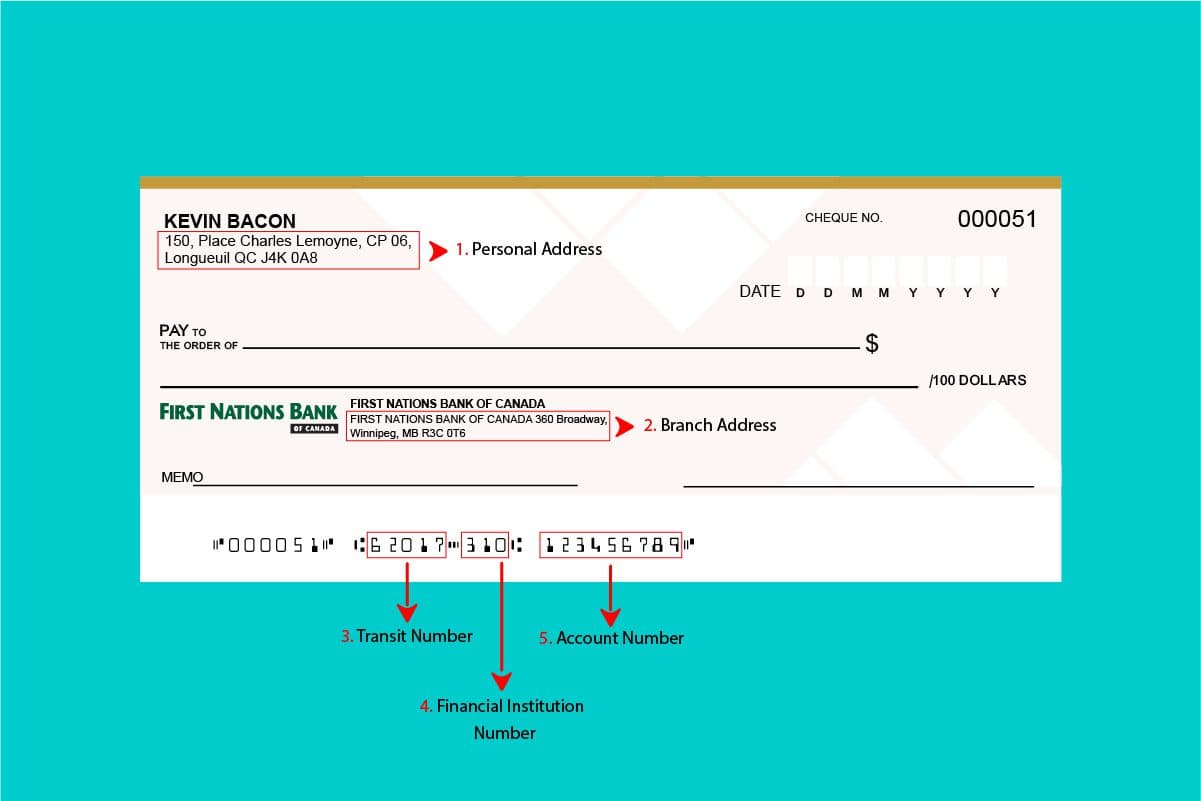First Nations Bank Sample Cheque: Everything you need to know to find and understand it
By Arthur Dubois | Published on 02 Mar 2022

From pre-authorizing payments to getting paid, sample cheques still come in handy… even though cheques are rarely used in Canada. The main reason you need an First Nations Bank sample cheque is to share your banking information with someone else.
Understanding Your First Nations Bank Sample Cheque
If you know what the numbers at the bottom of your First Nations Bank sample cheque mean, you can probably just share them… without having to go looking for a Sample Cheque in your banking portal every time someone asks for one.
So, here are the important features of a cheque in Canada that you should be able to recognize by looking at one :
1. Your home address
This is the information you don’t need to look at a sample cheque to know. However, it is often needed by those who ask you for a sample cheque.
2. Your branch address
This is the address of your First Nations Bank branch. Note that some First Nations Bank branches have more than one point of service.
3. Your branch transit number
This is a 5-digit number that identifies the First Nations Bank branch to which your bank account is associated.
4. Your bank Institution Number
The institution number is a three-digit number that identifies the financial institution you are dealing with, regardless of the branch you have chosen. First Nations Bank ’s institution number is 310.
5. Your account number (or folio number)
The account (or folio) number is the identifier for your bank account. Without the transit number and institution number, it cannot be used to transfer money. As a result, it is the most sensitive information you will find on your sample cheque, as it is the number that is associated with your bank account. This number varies in length depending on the financial institution but generally ranges from 7 to 12 digits.
How to find your sample cheque on the First Nations Bank online portal
Before the Internet, a sample cheque was a paper cheque with “SAMPLE” or “VOID” written on it to ensure that the cheque could not be used. If you have a chequebook, you can still do this. In fact, a sample cheque is a document that contains all the information displayed on a cheque, so you can still do it that way.
If you don’t have a chequebook, there is a simple alternative. Unlike some financial institutions, which allow a sample cheque to be downloaded from their client portal, First Nations Bank invites its clients to download a document that works the same way, a direct deposit form that you will need to complete yourself. Indeed, once you have completed the form, it will contain all the information available on a cheque and anyone who asks you for a sample cheque will accept it. Here are the steps to download the First Nations Bank of Canada direct deposit form from their website:
- Log into your account on the First Nations Bank website here: https://www.fnbc.ca/Personal/
- Click on «Accounts» and select the direct deposit form.
- Fill out the form with your information, like your address, account number, transit number, etc., which are all available in the online banking portal.
- All that’s left is to give the filled out form to whoever has requested it.
Now you know all it takes to find your account information as a First Nations Bank of Canada customer! Furthermore, you should now be able to write a cheque.
